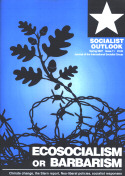- Ayrıntılar
-
Kategori: Political Ecology
Political ecology is the study of the relationships between political, economic and social factors with environmental issues and changes. Political ecology differs from apolitical ecological studies by politicizing environmental issues and phenomena.
The academic discipline offers wide-ranging studies integrating ecological social sciences with political economy (Peet and Watts 1996, p. 6) in topics such as degradation and marginalization, environmental conflict, conservation and control, and environmental identities and social movements (Robbins, 2004, p. 14).
Origins
The term "political ecology" was first coined by Frank Thone in an article published in 1935 (Nature Rambling: We Fight for Grass, The Science Newsletter 27, 717, Jan. 5: 14). it has been widely used since then in the context of human geography and human ecology, but with no real systematic definition. Anthropologist Eric R. Wolf gave it a second life in 1972 in an article entitled “Ownership and Political Ecology,” in which he discusses how local rules of ownership and inheritance “mediate between the pressures emanating from the larger society and the exigencies of the local ecosystem” (Wolf 1972, p. 202). Other origins include other early works of Eric R. Wolf as well as John W. Cole and Hans Magnus Enzensberger and others in the 1970s and 1980s.
The origins of the field in the 1970s and 1980s were a result of the development of radical development geography and cultural ecology (Bryant 1998, p. 80). Historically, political ecology has focused on phenomena in and affecting the developing world; since the field’s inception, “research has sought primarily to understand the political dynamics surrounding material and discursive struggles over the environment in the third world” (Bryant 1998, p. 89).
Scholars in political ecology are drawn from a variety of academic disciplines, including geography, anthropology, development studies, political science, sociology, forestry, and environmental history. Some modern prominent scholars include:
Read More










